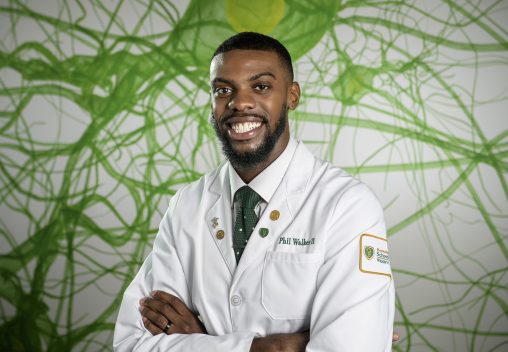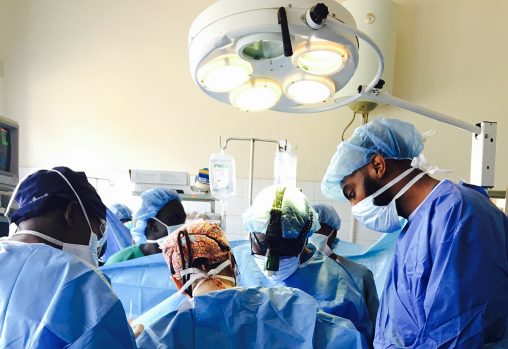
Phil Walker II, an M.D./Ph.D. dual-degree student at the Boonshoft School of Medicine, spent spring break studying neurosurgery in Kampala, Uganda.
Phil Walker II, an M.D./Ph.D. dual-degree student at the Wright State University Boonshoft School of Medicine, spent his spring break in March studying neurosurgery with a team from Duke University. He traveled to Kampala, Uganda, to participate in the annual Duke – Mulago Neurosurgical Skills Transfer Workshop held at Mulago Hospital.
The team consisted of more than 30 people affiliated with Duke, including physicians, nurses, scientists, technicians and biomedical engineers. The Duke team and a team from Mulago Hospital completed about 20 neurosurgical cases during that time.
“It was an eye-opening and humbling experience. There are certain luxuries we enjoy in the United States, as it pertains to health care, that I had never thought about or considered,” said Walker, a first-year medical student in the Boonshoft School of Medicine combined M.D./Ph.D. program. “The resourcefulness and ability to improvise in the operating room that the Duke and Ugandan neurosurgeons demonstrated was remarkable.”
In the operating room, he observed several cases including the removal of tumors that were exceptionally large or in very dangerous locations of the brain. One case involved an infant who suffered from a very rare congenital malformation causing it to have a mass larger than the child’s head itself.
“I am extremely grateful for such a unique type of exposure this early,” said Walker, who is the recipient of the Boonshoft School of Medicine Underrepresented in Medicine Scholarship and the M.D./Ph.D. Scholarship. “Even as a first-year student, I know there are lessons, both about medicine and about life, which will stick with me throughout my career.”
The Duke team was led by Michael Haglund, a neurosurgeon and professor of neurosurgery, global health and neurobiology at Duke University School of Medicine. Haglund founded Duke Global Neurosurgery and Neurology (DGNN) and also serves as the division chief. Though DGNN was founded in 2014, this year marked the 10th anniversary of the collaboration Haglund established between Duke University and Mulago Hospital/Makerere University College of Health Sciences to build neurosurgical capacity. DGNN has provided more than $10.25 million in used and new equipment to Mulago Hospital, produced 27 research publications and worked with Mulago Hospital to establish Uganda East African Neurosurgery Training Program. DGNN’s goal is to have 25 neurosurgeons throughout Uganda operating with modern equipment by 2022.
As the only non-Duke guest, Walker was touched by the way the Duke and Mulago teams welcomed him. Walker asked question after question, and almost everyone made an obvious effort to teach him what was happening around him.
“Every day, there was a different person giving me one-on-one, live tutorials on something different, including neuroanatomy and pathogenesis, specific neurosurgical procedures, how to interpret CT scans of the brain, how to read an electroencephalogram (EEG), how to calculate Glasgow Coma Scale scores and adjusting treatment regimens in the ICU,” he said.
Walker learned about Haglund and DGNN this past fall through searching the Internet. “I was looking for a way I could accomplish two very important goals in one project,” he said.
While he had done so throughout college, Walker knew he wanted to spend time shadowing a neurosurgeon in the operating room during his first year of medical school. He also wanted to travel abroad to gain global health experience, specifically in Africa.
“I googled those keywords for days, until I finally came across an article about DGNN,” Walker said. “DGNN wants to increase access to neurosurgery in East Africa and improve neurosurgical outcomes there. As I continued to learn more about its dynamic approach, I grew more eager to become involved.”
While Walker had to take out loans to cover the entire expense of the trip, he is glad he did so. “This experience was an absolutely phenomenal introduction into a field of medicine and research that I am passionate about,” Walker said. “I certainly gained a much fuller perspective on how social, behavioral and environmental factors influence neurosurgical needs.”
For more information about Duke Global Neurosurgery and Neurology, visit dukeglobalneurosurgery.com.
For giving opportunities that support students at the Boonshoft School of Medicine, visit medicine.wright.edu/community/giving-opportunities.


 Difficult conversations
Difficult conversations  Celebrated Wright State alum serving his community as surgeon
Celebrated Wright State alum serving his community as surgeon  Wright State University Foundation awards Students First Fund grants
Wright State University Foundation awards Students First Fund grants  Cosmic collection
Cosmic collection  Wright State revives student-faculty collaborative writing journal
Wright State revives student-faculty collaborative writing journal 